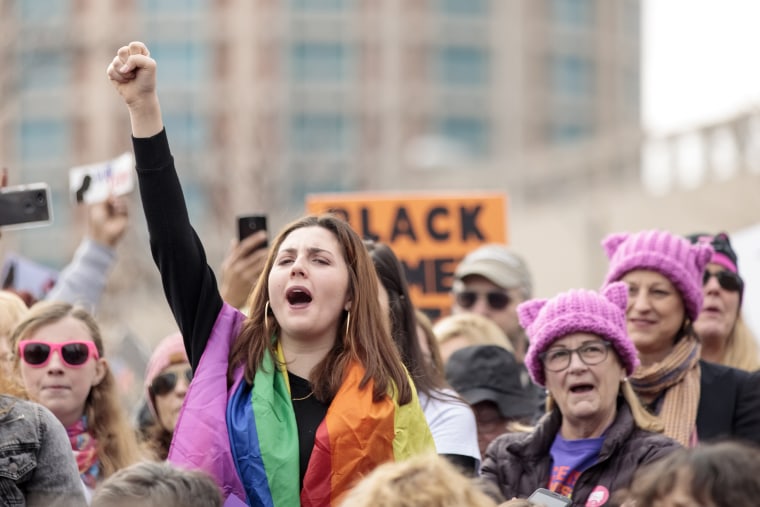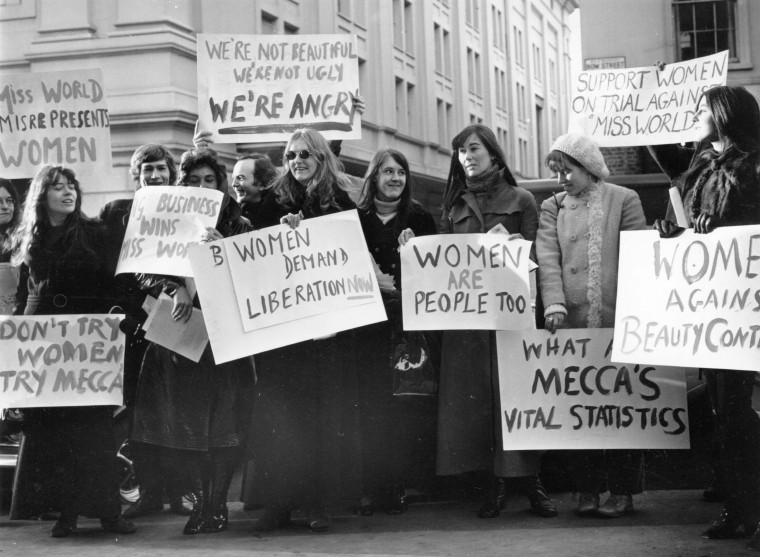The #MeToo movement exposed more than the prevalence of sexual harassment in America: A rift is widening between those who lived through the sexual revolution of the 1960s and early 1970s — particularly baby boomers — and generations X, Y and Z, who came of age later. The boomers and the so-called "laters" are out of sync. Their clashing values and expectations surrounding sexual expression are creating conditions for a cultural shakeup not seen in half a century.
And so 50 years after the Summer of Love, with its bright promises for women of release from repression, greater power over our destinies, and more choices in our sexual lives, the country now stumbles through the Winter of Discontent — when many of those promises are marked “undelivered.”
The 1960s sexual revolution left unfinished business that can’t wait any longer. As before, the terms of sexual expression in 2018 are part of a struggle both for societal justice and personal authenticity. Talk of liberation fills the air. But what does it mean to be free? Free to do what? Freedom from what?
The battle lines are reminiscent to those drawn during the 1960s — when younger people “got it” and older people hadn’t received the memo. #MeToo, the laters contend, is not anti-sex, but anti-coercion. Consent, when one person holds the cards financially, socially or physically, is fraught. Insisting that mutuality and respect are empowering is a no-brainer. Some older folks may deride them as overly sensitive "snowflakes," but to the laters, anti-#MeToo boomers sound akin to a “tired uncle who doesn't understand what's happening.”
The 1960s sexual revolution left unfinished business that can’t wait any longer.
For many boomers, the #MeToo movement calls up ghosts of McCarthyite intolerance and fears of returning to 1950s-style sexual authoritarianism. But a large chunk of the laters have not grown up in a moment of universal love and freedom. Instead, they grew up in a landscape of harrowing job insecurity, exploitive mass culture and the election of a grabber-in-chief, making our current moment a welcome uprising against outdated attitudes that left them anything but free.
While conservative boomers like political commentator Andrew Sullivan, 54, reacted to #MeToo as a dangerous conspiracy of “left-feminists” aiming “to burn it all down,” some older-generation liberals, like essayist Daphne Merkin, 63, have been similarly suspicious of “witch-hunts.” In the opposite camp, voices like actress Lupita Nyong’o, 34, call for an end to a “conspiracy of silence” surrounding men like Harvey Weinstein. Weinstein himself expresses boomer befuddlement: “I came of age in the 60s and 70s,” he lamented, “when all the rules about behavior and workplaces were different.”
The rules are now under review.
The dustup over comedian Aziz Ansari earlier in January — a woman accused Ansari of badgering her into sex acts during a date — shows how one generation’s cris de coeur can sound like garbled frequencies from a different planet to another. Feminist writer Jessica Valenti tweeted, “what the culture considers ‘normal’ sexual encounters are not working for us.” But such feelings seem alien to boomers like Caitlin Flanagan, who complained that “by the time you reach 50, intimate accounts of commonplace sexual events of the young seem like science fiction.”
One boomer rallying cry has been an open letter signed by 100 French women, most prominently the 74-year-old film icon Catherine Deneuve — who has since apologized for some of its content.
This letter denounced #MeToo and seemed to champion the freedom of men “to bother” — to seduce, to badger, even to masturbate on women’s bodies in the subway with impunity. Sexuality is a volatile field of mixed signals and clumsy approaches that leaves women disempowered only if they puritanically reject norms in which “stealing a kiss” (i.e. forcing it) is just part of excitement. To emphasize consent strips sexuality of its charm. #MetToo is anti-sex, the letter argued, turning women into victims or man-hating witch-hunters.
Others retort that the game is clearly rigged: who may freely express themselves sexually is determined by power. Exhibit A is boomer Donald Trump’s recorded boasting of his license to grab women’s genitals. In Trump’s starkly precise formulation, sexuality is not a mutual game of seduction, flirtation and gauging interest, but rather the freedom of one person to dominate another at will.
Revisiting the 1960s, as Danny Goldberg does in his new book, “In Search of the Lost Chord: 1967 and the Hippie Idea,” exposes part of why those dreams of a sexually liberated society never materialized. Women who joined the protests and movements shaping the culture were all too often marginalized or worse. Civil rights leader Stokely Carmichael, for example, famously joked, “the position of women in SNCC [Student Non-Violent Coordinating Committee] is prone.” The Diggers, a radical community-action group of the period, issued a statement “rape is as common as bullshit on Haight street.”
Revisiting the 1960s exposes part of why those dreams of a sexually liberated society never materialized.
Some women felt that they had lost the ability to reject forms of sexuality that disempowered them, as David Allyn notes in “Make Love, Not War: The Sexual Revolution: An Unfinished History.” While male rock gods and gurus were celebrated for their sexual prowess, females became either disposable groupies or uptight bitches if they didn’t play along. Access to birth control in 1960 and legal abortion in 1973 gave women (especially affluent women) a means of controlling their reproductive lives. But without real economic, social or political power, the victory was — and remains — hollow.
In the decades since, America has witnessed the scaled-up commercialization of sex, which amplifies the objectification of women; the unchecking of corporate power, with its suppression of worker’s rights; and the flourishing of a political system which leaves women, minorities and anyone who is not rich severely underrepresented. A figure like Weinstein pulls the ugly elements together: a bullying corporate gatekeeper, an influential wealthy man professing liberal values while crushing women’s lives and an exemplar of cultural attitudes that define male success as sexual domination.
In some areas, the generations agree on updates to the status quo. A new poll shows that almost 9 in 10 Americans believe that "a zero-tolerance policy for sexual harassment is essential to bringing about change in our society."

But there is division on what harassment actually means. Contrary to the popular image, 83 percent of millennials said that showing someone porn at work was sexual harassment, compared to 94 percent of baby boomers. Research has also shown disagreements about sexuality in general: younger generations are less accepting of “pressured sex,” while many boomers question why younger women seem to feel that they lack sexual agency.
As a new script for sexuality emerges, one optimistic revision could ensure that Americans in the workplace are not powerless: from halting forced arbitration and the abuse of nondisclosure and confidentiality agreements, to improving insecure jobs and lack of labor law enforcement. With these changes, both accusers and accused will be more likely to receive due process.
A rewrite will also involve changing norms of behavior beyond the workplace. Just as thoughtful people now consider their words and actions on race, so many will increasingly be asked to be aware of how expressions of their sexual attitudes and behavior are received by others. This process is difficult and the needs of all ages, orientations, genders, races and classes will have to be taken into account.
But rather than pitting one generation against each other, the shakeup will hopefully come to focus more on younger generations dealing with the societal business that older generations left unfinished — business confronted by the Occupy Movement, Black Lives Matter and now, #MeToo.
Employment laws like the Civil Rights Act of 1964, which made workplace gender discrimination illegal but left it rampant in practice (witness the wage gap), are getting a rethink.
More broadly, abstract ideas about consent, power and freedom in the context of sexuality are getting unpacked. How do we rebalance forces that led us from 1960s ideals of universal love to an internet culture which leaves many feeling sexually numb and degraded?
It’s not yet obvious where we’re going, but it’s clear where we’re not. America isn’t going back to the Victorian era, when women and minorities had little power over their economic, social or sexual lives. We also won’t be returning to the 1950s, when heterosexuality was the only acceptable sexual identity and sex outside marriage was taboo.
But we can’t stay stuck in a world in which powerful white men largely control our media and politics, and male-dominated corporations rule brutally over working people who face harassment, sexual and otherwise, as they strive to make a living.
The train has lurched out of the station, reeling and screeching. There will bone-rattling bumps and angry wrestling over whose vision will guide us. Sometimes it will feel as if we’re going off the rails. To arrive at a better place, members of every generation will have to brace themselves for a hell of an uncomfortable ride.
Lynn Stuart Parramore is a cultural theorist who studies the intersection between culture and economics. Her work has appeared at Reuters, Lapham’s Quarterly, Salon, VICE, Huffington Post and others.
